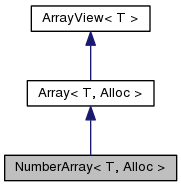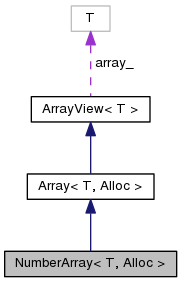|
| | NumberArray () |
| |
| | Alloc (n, x) |
| |
| | Nres_ (size()) |
| |
| | name_ () |
| |
| | NumberArray (size_t n, T const *x) |
| |
| | NumberArray (ArrayView< T > const &a) |
| |
| | NumberArray (NumberArray< T > const &a) |
| |
| | NumberArray (std::vector< T > const &a) |
| |
| | NumberArray (std::initializer_list< T > a) |
| |
| template<typename ForwardIterator > |
| | NumberArray (ForwardIterator i, ForwardIterator j) |
| |
| | NumberArray (NumberArray< T > &&a) |
| |
| | ~NumberArray () |
| |
| size_t | size () const |
| | Item count. More...
|
| |
| virtual size_t | resize (size_t n) |
| | Resize array. More...
|
| |
| size_t | reserve (size_t n) |
| | Reserve memory. More...
|
| |
| T & | operator[] (size_t i) |
| | Element-wise access (non-const). More...
|
| |
| T const & | operator[] (size_t i) const |
| | Element-wise access (const). More...
|
| |
| iterator | begin () |
| |
| const_iterator | begin () const |
| |
| const_iterator | cbegin () const |
| |
| iterator | end () |
| |
| const_iterator | end () const |
| |
| const_iterator | cend () const |
| |
| T & | front (int i=0) |
| |
| T const & | front (int i=0) const |
| |
| T & | back (int i=0) |
| |
| T const & | back (int i=0) const |
| |
| virtual void | push_front (T const &a) |
| | Add element to beginning. More...
|
| |
| virtual void | push_back (T const &a) |
| | Add element to end. More...
|
| |
| T | pop_back () |
| | Remove the last element. More...
|
| |
| template<class InputIterator > |
| void | append (InputIterator first, InputIterator last) |
| | Append a range of values at end. More...
|
| |
| bool | empty () const |
| | Check that size equals to zero. More...
|
| |
| void | clear () |
| | Fill array with zeros. More...
|
| |
| void | drop () |
| | Reset array: deallocate everything, resize to zero. More...
|
| |
| NumberArray< T > & | operator= (NumberArray< T > const &b) |
| |
| NumberArray< T > & | operator= (NumberArray< T > &&b) |
| |
| NumberArray< T > | conj () const |
| | Return complex conjugated array. More...
|
| |
| double | norm () const |
| | Compute usual 2-norm. More...
|
| |
| template<class Functor > |
| auto | transform (Functor f) const -> NumberArray< decltype(f(T(0)))> |
| | Apply a user transformation. More...
|
| |
| ArrayView< T > | slice (size_t left, size_t right) const |
| | Return a subarray using ArrayView. More...
|
| |
| std::string | toBlob () const |
| | Convert to SQL BLOB. More...
|
| |
| void | fromBlob (std::string const &s) |
| | Convert from SQL BLOB. More...
|
| |
| void | link (std::string name) |
| | Link to HDF file. More...
|
| |
std::tuple< NumberArray< int >
, NumberArray< T > > | compress (int consec) const |
| | Get compressed array. More...
|
| |
| NumberArray< T > | decompress (NumberArray< int > const &zero_blocks) const |
| | Decompress array. More...
|
| |
|
| virtual T * | data () |
| | Data pointer. More...
|
| |
| virtual T const * | data () const |
| |
|
| bool | hdfsave (std::string name, bool docompress=false, int consec=10) const |
| | Save array to HDF file. More...
|
| |
| bool | hdfsave () const |
| |
|
| bool | hdfload (std::string name) |
| | Load array from HDF file. More...
|
| |
| bool | hdfload () |
| |
| | Array () |
| |
| | Alloc::alloc (n)) |
| |
| | Array (size_t n, T const *const x) |
| |
| | Array (Array< T > const &a) |
| |
| | Array (const ArrayView< T > a) |
| |
| | Array (Array< T > &&a) |
| |
| | Array (std::vector< T > const &a) |
| |
| | Array (std::initializer_list< T > a) |
| |
| template<typename ForwardIterator > |
| | Array (ForwardIterator i, ForwardIterator j) |
| |
| | ~Array () |
| |
| size_t | size () const |
| | Return number of elements. More...
|
| |
| T & | operator[] (size_t i) |
| | Element-wise access (non-const). More...
|
| |
| T const & | operator[] (size_t i) const |
| | Element-wise access (const). More...
|
| |
| iterator | begin () |
| |
| const_iterator | begin () const |
| |
| iterator | end () |
| |
| const_iterator | end () const |
| |
| T & | front (int i=0) |
| |
| T const & | front (int i=0) const |
| |
| T & | back (int i=0) |
| |
| T const & | back (int i=0) const |
| |
| template<class InputIterator > |
| void | append (InputIterator first, InputIterator last) |
| | Append more items. More...
|
| |
| void | insert (iterator it, T x) |
| | Insert item. More...
|
| |
| bool | empty () const |
| | Check that size equals to zero. More...
|
| |
| Array< T > & | operator= (Array< T > const &b) |
| |
| Array< T > & | operator= (Array< T > &&b) |
| |
| | ArrayView () |
| |
| | ArrayView (size_t n, T *ptr) |
| |
| | ArrayView (ArrayView< T > const &a, size_t i=0, size_t n=0) |
| |
| | ArrayView (Array< T > const &a, size_t i=0, size_t n=0) |
| |
| | ArrayView (NumberArray< T > const &a, size_t i=0, size_t n=0) |
| |
| | ArrayView (const_iterator i, const_iterator j) |
| |
| | ArrayView (ArrayView< T > &&r) |
| |
| virtual | ~ArrayView () |
| |
| ArrayView< T > & | operator= (const ArrayView< T > v) |
| | Assignment operator. More...
|
| |
| T & | operator[] (size_t i) |
| | Element-wise access (non-const). More...
|
| |
| T const & | operator[] (size_t i) const |
| | Element-wise access (const). More...
|
| |
| size_t | size () const |
| | Length of the array (number of elements). More...
|
| |
| iterator | begin () |
| |
| const_iterator | begin () const |
| |
| iterator | end () |
| |
| const_iterator | end () const |
| |
| T & | front (int i=0) |
| |
| T const & | front (int i=0) const |
| |
| T & | back (int i=0) |
| |
| T const & | back (int i=0) const |
| |
| void | fill (T x) |
| | Fill the array with a value. More...
|
| |
| bool | empty () const |
| | Check whether the size is equal to zero. More...
|
| |
| template<class = typename std::enable_if<is_scalar<T>::value>> |
| double | norm () const |
| | Two-norm (defined only for scalar data type). More...
|
| |
template<class T, class Alloc = PlainAllocator<T>>
class NumberArray< T, Alloc >
Class NumberArray is intended as a Hex's replacement for std::vector<T> for number type T. Properties:
- correct memory alignment of the storage
- even number of allocated elements (zero padded) for the use in SSE accelerators
- reserved storage reducing necessary reallocations
- basic iterator interface (members Array::begin(), Array::end()).
- HDF5 interface (ability to save and load to/from HDF5 data files)
- a collection of overloaded arithmetic operators (sum of two arrays, difference, multiplication by a number etc.)




 Public Types inherited from Array< T, Alloc >
Public Types inherited from Array< T, Alloc > Public Types inherited from ArrayView< T >
Public Types inherited from ArrayView< T > Public Member Functions inherited from Array< T, Alloc >
Public Member Functions inherited from Array< T, Alloc > Public Member Functions inherited from ArrayView< T >
Public Member Functions inherited from ArrayView< T > Data Fields inherited from Array< T, Alloc >
Data Fields inherited from Array< T, Alloc > Protected Attributes inherited from ArrayView< T >
Protected Attributes inherited from ArrayView< T > 1.8.5
1.8.5